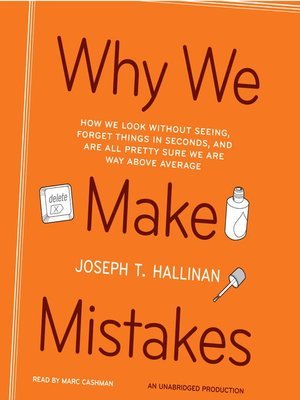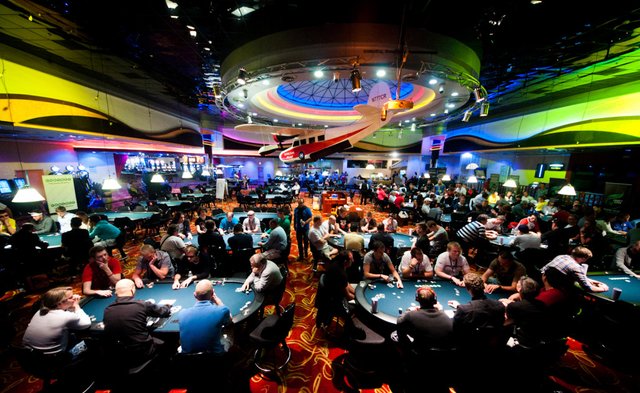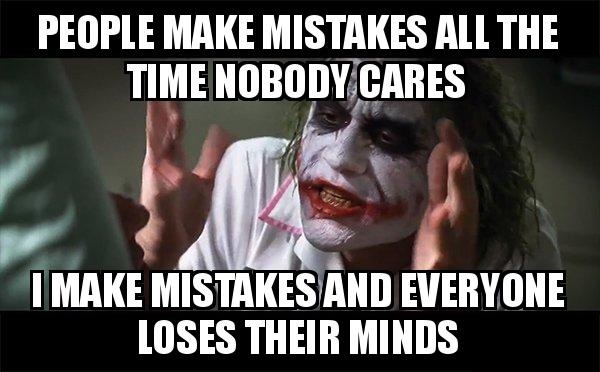Why We Make Mistakes
Hello to everyone!
A few days ago, I discovered for myself very interesting book...

It would seem, who among us is not mistaken? What is there to talk about? But the author decided to approach from the scientific point of view precisely to the question "why?" This book was published because the author believes that the number of mistakes made by us can be reduced, since the reasons are very often common.
Let's see what, according to Mr. Joseph T. Hallinan, are the causes of mistakes!
We look, but we do not always notice (look at things with a blind eye).
Often we tend not to observe, but instantly assess the whole situation with a glance, especially if it concerns routine processes.
Yep! This is a frame from the movie "Route 60". This is what came to mind - Black Hearts and Red Spades!

Change places the plastic "containers" with salt and sugar in my house, and morning coffee will cheer me up especially! Because I do not look at it, I do it out of habit - on the left - salt, right with sugar...
I am sure that many people do not pay attention to some "household issues", they do a lot of things out of habit, without paying proper attention. Because it's faster... Put the trash bin in another place, and you will still walk with the garbage to the "former bin habitat", although you know you moved it! And what's more, you can pass by looking at it!
Conclusion: to avoid mistakes in something, first of all pay attention to your vision, try to see more and look narrowly at the "little things".
We are looking for meaning in everything.
We are looking for meaning in everything, even if it is not. This reason reminded me of the old Soviet film...
Frame form popular-science film "I and others" 1971.

The film consists of documentary footage conducted psychological experiments with ordinary people. Experiments are conducted to confirm the fact that a person can think out everything that he could not remember, the film reveals the human ability to fill the lack of information with conjecture and fantasy. Demonstrates the basics of manipulating the consciousness of people: people are able to succumb to the opinions of others, even if it is absurd! And find meaning where it does not exist, having accepted the opinion of the crowd!
Conclusion: in order not to be mistaken, allow the probability that some objects and phenomena may lack some higher meaning, and do not try to look for the interrelation in everything and everywhere. Think critically!
We are not looking for the fullness of the picture.
Often, some facts for us are the basis for thinking one way or another. But how often do we wonder if these facts are enough to judge for sure? For example - do we have enough information about the education of a person to say about his competence? After all, information can be false! Diploma of education can be bought! A person can be lazy and stupid and no diploma will make him a high-class specialist...
I really like to eat delicious! I can talk about lobsters and truffles... But that does not make me a cook or a gourmet! Because...

Conclusion: if you do not want to make a serious mistake, there must be a lot of facts and the reasoning must be based on the logic and completeness of the information. It is necessary to see "the whole picture"!
We all wear rose-colored glasses!
To avoid cognitive dissonance, we give some of our mistakes and problems a positive connotation.

Heck! I nearly won! Now I'll put everything on the black and definitely win!
Among gambling people it occurs most often... Enough! Go home, while you still have it! But no! If the whole evening is unlucky, then right now - you will win! This topic is well revealed in the book by Barbara Ehrenreich - Bright-sided.
In this utterly original debunking, Barbara Ehrenreich confronts the false promises of positive thinking and shows its reach into every corner of American life, from Evangelical megachurches to the medical establishment, and, worst of all, to the business community, where the refusal to consider negative outcomes--like mortgage defaults--contributed directly to the current economic disaster. With the myth-busting powers for which she is acclaimed, Ehrenreich exposes the downside of positive thinking: personal self-blame and national denial. This is Ehrenreich at her provocative best--poking holes in conventional wisdom and faux science and ending with a call for existential clarity and courage.
Conclusion: try to be objective in your assessments! Excessive drama or denial of the obvious under the auspices of "everything will be wonderful, because I think positively" - equally dangerous. Be realistic in the perception of the situation and your decisions!
This is not all the author's observations, in the book itself many life situations and lifhakas are described! If you are interested - read it. Maybe you'll find something useful for yourself and become a make fewer mistakes!
Sincerely, Terry Craft.
Sources:
- Book by Joseph T. Hallinan - Why We Make Mistakes.
- Book by Barbara Ehrenreich - Bright-sided.
- Popular-science Old Soviet film "I and others" 1971.
- Own thoughts - Damn, how interesting!
We make mistakes because that is what makes us unique.
The only thing that ia defined as a mistake is that which we label as such, everything else is just action.
Good point @vangelov. Infact making mistakes is human and we will not be a better person in life or business if we do not make mistakes and learn from them. Mistakes are only bad if we continue making the same mistakes meaning that we never learn...Good posts indeed @terrycraft
Great point of view! I'll have to think about this :)
Mistakes just mean, Were human :)
Yep! But sometimes I want to avoid fails... just sometimes :)
We have to make mistakes in order to learn
Great post. I like good posts. Thank you.
While it is good to have a positive outlook you can't become ignorant to facts or the consequences of all your decisions. You have to take a step back from time to time and acknowledge what could go wrong in situations and then from there access the best plan of action to take.
In life, everything often goes not according to plan and not as it should have been done :)
It's important to learn from your mistakes rather than be angry at the world for letting bad things happen. Change yourself from within first and with that the outwardly world will change too
True!
Fantastic review. I am itching to get my hands on this book because of your review. I have always been a proponent of 6 thinking hats theory (Edward De Bono) which advocates all around fact, analysis and thinking to be involved in decision making.
Would love to see more posts from you. Following you. Please feel free to follow me and see my posts today if you like interesting wildlife pictures with a story like this one https://steemit.com/wildlife/@vm2904/riding-high-free-ride-with-a-meal-of-ticks, https://steemit.com/bwphotocontest/@vm2904/bwphotocontest-nature-s-artwork-of-symmetry-the-passionflower and https://steemit.com/photography/@vm2904/attitude-the-meek-shall-rule-the-earth
Please provide your comments, upvote and resteem if you like any of my blogs
Thank you @vm2904! I'll chek your posts!
We are humans so we make mistakes but learning from mistakes and not repeating it will make us perfect.
@terrycraft you're post made me remember this scene from the dark knight !!

Lol
very nice